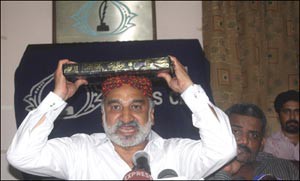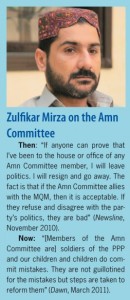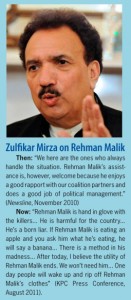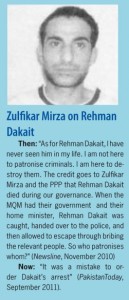The Shape of Things to Come
By Amir Zia | News & Politics | Published 14 years ago
 In an era of sound bites, fast food, and 20-20 cricket matches, the route to stardom is often short and swift. And so it was for PPP’s former home minister Dr Zulfiqar Mirza. Like a shooting star, Mirza blazed across television screens on August 28, holding audiences spellbound. Loud tone, inflammatory language, and startling revelations and accusations — it was a performance guaranteed to catch maximum viewership and win fantastic TRPs. Overnight the controversial doctor became an unlikely hero and was feted by all those who have issues with the Muttahida Qaumi Movement and Rehman Malik.
In an era of sound bites, fast food, and 20-20 cricket matches, the route to stardom is often short and swift. And so it was for PPP’s former home minister Dr Zulfiqar Mirza. Like a shooting star, Mirza blazed across television screens on August 28, holding audiences spellbound. Loud tone, inflammatory language, and startling revelations and accusations — it was a performance guaranteed to catch maximum viewership and win fantastic TRPs. Overnight the controversial doctor became an unlikely hero and was feted by all those who have issues with the Muttahida Qaumi Movement and Rehman Malik.
Zulfiqar Mirza’s outburst at the Karachi Press Club on August 28, televised live on all TV channels, has fired up several popular political commentators and reputed analysts, who are spilling over with analysis. For some, Mirza’s “thunderbolt has shaken the Zardari status quo,” while for others it has exposed the MQM and its anti-state designs. There are a few who believe that Mirza’s tirade had President Asif Ali Zardari’s blessings and is part of his carrot-and-stick policy with which he deals with the MQM. And then there are those analysts who believe that Pakistani politics has changed forever after Mirza’s “disclosures.” His assault on Interior Minister Rehman Malik is being viewed as a watershed in the country’s traumatic history.
Mirza’s disclosures — made sometimes with one hand placed over the Quran or with the Quran held over his head — seem to have struck a chord with many frustrated Pakistanis, who are worried by the state of the country’s politics and violence and killings in Karachi.
In an atmosphere thick with a barrage of allegations and counter-allegations emanating from all sides, people need to take a step back to weigh and review the implications of Mirza’s statements, which have intensified ethnic and political bitterness in Sindh. Putting aside multi-hued conspiracy theories, the focus should be on Zardari’s stated policy of reconciliation, which does not gel with Mirza’s hard line against the MQM.

The allegations Mirza levelled against the MQM in his address to the media include the involvement of militants belonging to this urban-based party in the assassinations of political rivals, as well as the alleged letter written by its leader Altaf Hussain to former British Premier Tony Blair in September 2001, in which he assured him of MQM’s support in the fight against terrorism, and asked western powers to help in disbanding the ISI. Mirza’s charge-sheet against the MQM, which contains several oft-repeated allegations, is aimed to put Sindh’s second largest party on the back foot by opening a Pandora’s box of past and present controversies surrounding it.
Mirza’s press conference, in which he announced his resignation from the Sindh cabinet and party office, came after more than 1,400 killings had taken place in the first eight months of 2011, and when finally after a long delay the PPP government half-heartedly ordered a crackdown on the criminal networks operating from Lyari — one of its own strongholds in Karachi — as part of a surgical strike in nine major trouble spots in the city.
In this polarised atmosphere, one can argue why Lyari was earmarked for the operation first and not any other part of the city. According to Rehman Malik, the PPP decided to target its own constituency first, in order not to appear partisan to its own coalition partners. Additionally, the suo moto hearing, currently underway, by a five-member bench of the Supreme Court on Karachi’s turmoil which claimed more than 500 lives in July and August alone, must certainly have intensified pressure on the government and forced it to act amidst calls by many quarters to summon the army for restoring peace and the rule of law in Pakistan’s commercial and financial hub. The government’s move to launch an operation in Lyari may have angered Mirza who is known to have developed close ties with the People’s Amn Committee, but the bottom line remains that while there are other powerful criminal-cum-political players in the city, the recent wave of mayhem, extortion and crime has been largely and directly linked to the controversial Peoples’ Amn Committee, established by the notorious gangster Rehman Dakait, who was killed in a police encounter in August 2009.
The Amn Committee remains a unique phenomenon — a crime mafia, a platform for disgruntled PPP supporters, as well as workers fighting what they call their “corrupt elected representatives,” and a pro-peoples welfare group akin to Robin Hood and his band of Merry Men, who once ruled Sherwood Forest in 13th century England, robbing the rich to give to the poor. The Committee did exactly that and introduced several social welfare programmes in Lyari — Karachi’s oldest, but one of the most backward neighbourhoods — and enjoys considerable support among many of its residents. But unlike Robin Hood and his archers, the criminal activities carried out by supporters of the Amn Committee have offset its pro-people image.
The Committee, now led by Uzair Baloch, a relative of Rehman Dakait, operates more as a crime mafia, extending its reign of terror across most of the major retail and wholesale markets located in the vicinity of Lyari. In 21st century Karachi, a 13th century mindset means only trouble. However, the problem is not of criminal activities alone.

Ever since some local PPP leaders — including Mirza — began to prop up the Amn Committee as a counter-balancing force against the MQM’s muscle power to expand their influence and turf using the Committee’s militants, violence in the city has risen to another level. Efforts by the Amn Committee to branch out to other areas of the city in the past three years have led to a wave of killings, an intra-gang war, and political and ethnic violence.
It can be said that after the relative calm and peace during the rule of former military leader Pervez Musharraf, who was accused of favouring the MQM in a big way, Karachi drifted back to the brutality and lawlessness witnessed in the 1980s and 1990s when widespread ethnic violence, target killings, and tortured bodies stuffed in gunny bags were a norm. The decade of the 1980s saw the rise of violent ethnic politics, and witnessed Altaf Hussain and his party emerge as the dominant force in urban Sindh. Most of the bloodletting during the 1990s was the result of the conflict between the mainstream MQM and its dissident, splinter group, now known as the MQM-Haqiqi, in the creation of which state institutions played a key role as they tried to prop up their own hand-picked leadership.
It was during these traumatic times that the city first witnessed the rise of organised political extortion or bhatta — the ‘credit’ for which is mostly given to the MQM for putting the system in place. The MQM was known for getting a lion’s share of the booty by hook or by crook, but in recent years it has curbed its practice of using brute force to raise funds or bhatta, in an attempt to carve a niche for itself in mainstream national politics and expand its network to the other parts of the country. However, most other political and religious parties and ethnic groups in Karachi jumped into the fray of raising funds in the name of donations, often at gunpoint, and continue to fight one another over the collection of animal hides during Eid-ul Azha, and over zakat, fitra and charity during Ramazan.
The Amn Committee is among the groups that have jumped into the fray of fund collection. Recently, not only did it lock horns with the MQM, but its blatant use of force to extort money even forced traders and shopkeepers to stage an unprecedented shutter down in April earlier this year, with frequent warnings of repeating the same last month. Mirza’s support of the Amn Committee — to the extent that he even called its members “his children” — has been the bone of contention between the PPP and the MQM for some time now and even cost him his job at the home ministry. Much to Mirza’s dismay, the PPP’s central leadership outlawed the Amn Committee in March 2011, though its operations continued despite the official ban. Interior Minister Rehman Malik played a key role in addressing the MQM’s concerns regarding the Amn Committee and its activities.
As home minister, Mirza could have remained neutral. Instead he chose to patronise them to counter the MQM. Mirza’s press conference, too, would have carried more weight and underlined his sincerity if, along with the MQM, he had mentioned the involvement of the Amn Committee in crime, violence and extortion in Karachi. But he chose to reveal only half the truth in an apparent attempt to deflect the focus from the Amn Committee and the notorious Lyari warlord, Baba Ladla.
The criminalisation of politics and the politicisation of crime have been a bane for Karachiites for decades. Almost all major political parties operating in Karachi have armed wings, and many of them remain directly or indirectly involved in crime. The ranks of political parties are infested with criminals from different ethnic backgrounds, who run crime and encroachment networks in the guise of political party workers.
One can differ with the PPP on countless issues, but harbouring criminals and extortionists was never part of its history and goes against its grain and political ethos. PPP workers, especially while fighting the oppressive martial law regime of General Zia-ul Haq, became more radical after the controversial hanging of their founding chairman and elected Prime Minister, Zulfikar Ali Bhutto. Some even opted for an armed struggle, but it was a political struggle. Mirza and his associates, by design or by default, tried to change the PPP ethos for narrow, short-term gains.

Today, the MQM stands in a sharp contrast to its past of conducting politics on ethnic lines. Now it woos other ethnic groups, putting aside its 1980s and 1990s style of politics which does not suit its future ambitions of transforming itself into a national party. In its own self-interest, the MQM is trying hard to grow out of the politics of extortion and militancy. However, the party still holds the muscle power that can bring the city to a grinding halt at a few hours notice, and match fire with fire with political rivals and dissidents. And every once in a while it returns to its violent past when it feels its interests are being threatened. The MQM will have to shun the politics of violence and start playing by the book to whitewash its tainted past which catches up with it time and again.
It is the responsibility of all major political parties to build a consensus on the dos and don’ts of conducting politics. They should undertake to expel criminals from within their ranks, take a pledge of non-violence, and refrain from activities that disturb public life and inconvenience citizens, such as holding protests and rallies and announcing shutterdown strikes that bring all economic activity to a halt causing immeasurable suffering to the common man.
While public and media pressure is vital to push political parties in this direction, this move cannot achieve any measure of success unless state institutions, especially the intelligence agencies, stop playing one group against the other and allow their favourites to indulge in crime and violence. Our establishment, which has a sordid history of meddling in politics, should resist the temptation of propping one group against the other. Instead, they should focus on establishing the rule of the law, and ensure the independence of the police force and the effectiveness of the judiciary so that criminals and terrorists can be punished irrespective of their political, ethnic, or religious affiliations.
In other parts of the world, consensus has built the rules of co-existence as political rivals and diverse ethnic and religious groups learn to live, tolerate and accommodate each other. Pakistan needs to do the same to break political dogmas, start consensus-building and redefine the rules of the game. While all political forces have several skeletons in their cupboards and have made grave mistakes, there is a need to try and make democracy work and function out of this very mess and chaos.
While going after criminals operating in Lyari is a step in the right direction, the government must also take the MQM, as well as the Awami National Party (ANP) into confidence, and then continue to expand its dragnet to other areas.
Another important factor to keep in mind while evaluating Mirza’s charges is his turn-around from the publicly stated PPP policy of reconciliation and consensus-building. One can criticise and differ with President Zardari on a hundred and one counts, but his move to break ice with the MQM following the 2008 elections was a step in the right direction.
The PPP and the MQM remain natural allies not just because they represent rural and urban constituencies in the same province, but also because both parties endorse secular politics, which in its essence serves as a bulwark against the forces of religious extremism and terrorism. Ideologically, these two political forces have a lot more in common with each other, and with the ANP.

An alliance between the MQM, PPP and the ANP would make perfect political sense and would be vital for peace and progress in Sindh. The central leaders of these parties have an awareness of the necessity of this alliance. And it goes to their credit, that in times of crisis and despite internal strains and clashes of interest at the lower cadres of their respective parties, they have managed to keep their wobbly alliance working for this long. Case in point: when the MQM walked away from the coalition, the lines of communication between the two remained open. This is an absolute must for building peace, and is vital for the survival of democracy.
There should be zero-tolerance among all the major political parties for those political workers who promote ethnicity or sectarianism. Second and third tier hardliners within in the PPP and MQM ranks who seem to thrive on conflict and tussle between the two need to be kept on a tight leash for the greater public good and in the national interest. Rural and urban Sindh, and the inhabitants of this province, must join hands for peace and the rule of law. Ethnic groups living in Sindh are bound by unbreakable cultural, economic and political ties, which need to be strengthened by not forcing uniformity, but by accepting and celebrating their diversity.
Mirza tried to play on the wicket of the nationalists when he made absurd allegations of a conspiracy to transform Sindhis into Red Indians, and by passing some bitter remarks against Urdu-speaking immigrants and their descendants. But he he must remember that even the nationalists failed to gain mileage in rural Sindh, where the federalist PPP continues dominate election results.
It is ironic that while holding the Holy Quran, Mirza conveniently forgot the role of certain state institutions in creating the present mess in Sindh through their unconstitutional and unlawful activities of playing one political force against the other and stifling democratic forces, especially all through the 1980s and 1990s.
The PPP suffered the most during that period. Instead, Mirza was full of praise for the ISI and the army as he tried to prove his patriotic credentials. Praising state institutions surely is no crime, but Mirza’s context should be a cause of concern for his party leadership.
Zulfikar Mirza, who claims to be such a PPP diehard and a true friend of Asif Ali Zardari, should have used the party platform to argue and air his dissent. By coming out in public with his differences and attacking his own party, he has only embarrassed his party leadership.

He would have served the PPP better if instead of patronising the Amn Committee, he had channelled his aggression in trying to create economic opportunities and jobs for the people of Lyari and improving their lives through social development and education.
But the fire-spitting Mirza‘s style of politics could prove damaging to Sindh and its people, and the PPP’s stated vision of national reconciliation. How much more leverage will President Asif Ali Zardari give his friend, and how will he handle Mirza’s, should we call it calculated or emotional, outburst, only time will tell.
Amir Zia is a senior Pakistani journalist, currently working as the Chief Editor of HUM News. He has worked for leading media organisations, including Reuters, AP, Gulf News, The News, Samaa TV and Newsline.


